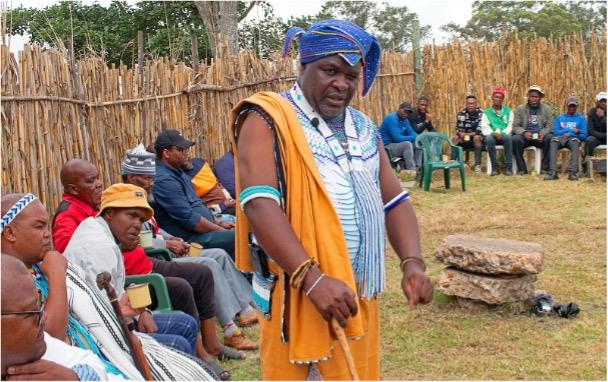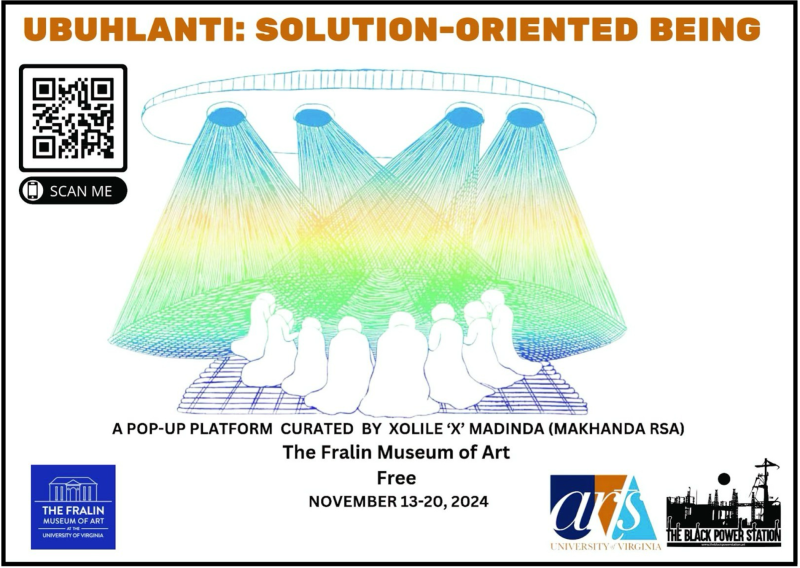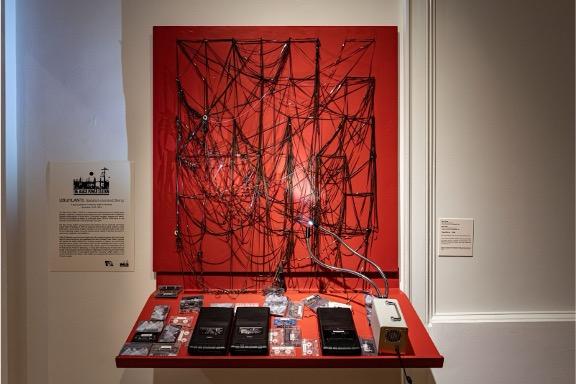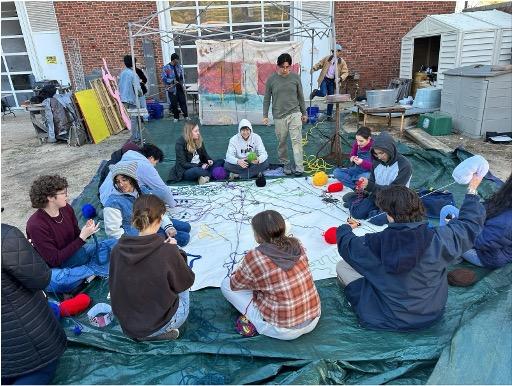UBUHLANTI FROM SOUTH AFRICA TO UVA: Solution Based Curating at The Fralin Museum of Art
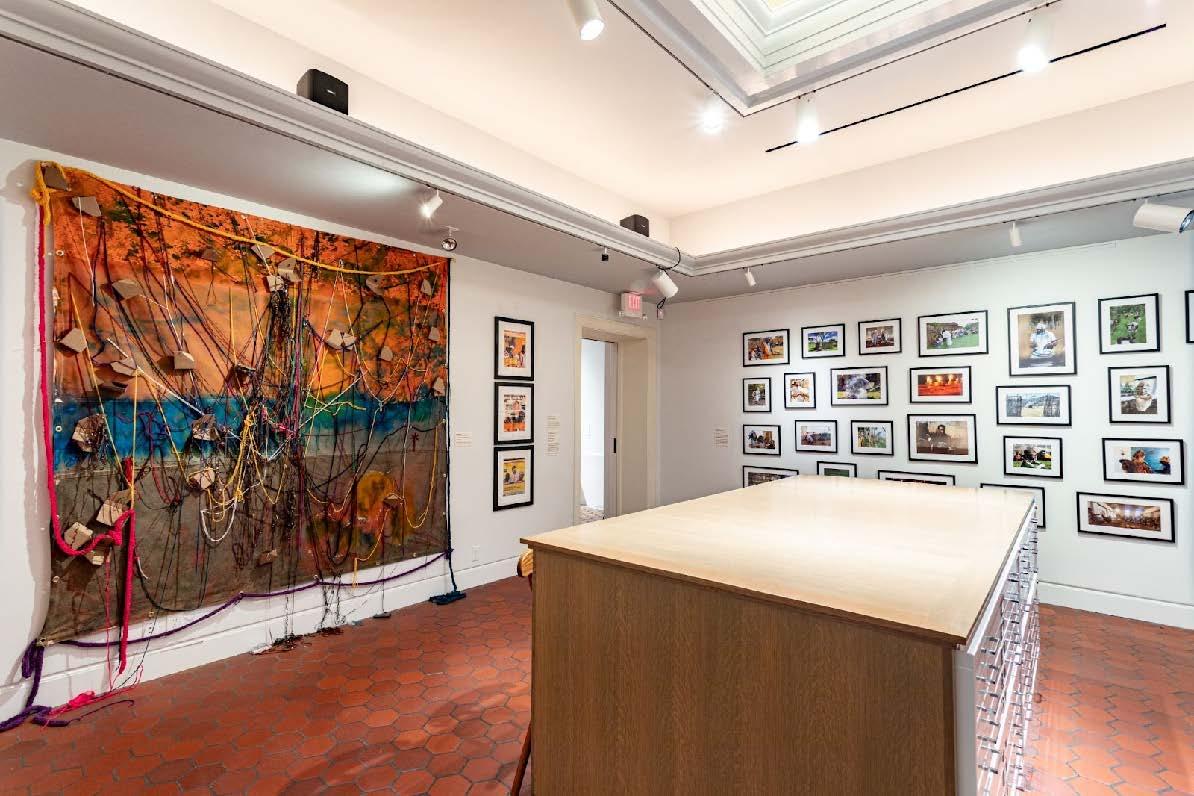
What does it mean to bring the world to UVA? In recent years, “curating” has become a hot-topic everywhere from museums and universities to fine-dining and social network influencers. As consumers, we can now select from a global array of options in every domain of life. While this has made us more attuned to the diversity of “world” experiences, it has also resulted in the inequalities that curator Geraldo Mosquero has identified, between “curated” and “curating” cultures. Bridging this divide has been a central question for Profs. Noel Lobley (music) and Henry Skerrritt (art history) as they developed the Co-Present Art Initiative with Xhosa artist Xolile ‘X’ Madinda in both Makhanda, South Africa and Charlottesville, Virginia.
For several decades, both Lobley and Skerritt’s research has focused on community driven approaches to curating–thinking beyond the well-worn extraction paradigm. Instead, they co-create newly-imagined spaces for hosting art and music that amplifies solution-oriented local knowledge systems through re-engagement with the communities from where it came.
Lobley is a sound curator, artist and author of Sound Fragments, a multiple award winning book on the contemporary re-activation of the world’s largest ethnographic archive of African music in Africa. As part of his work based in South Africa, he met Xolile ‘X’ Madinda–a Xhosa hip hop artist, activist and founder of The Black Power Station in Makhanda, Eastern Cape. The Black Power Station (TBPS) is an intergenerational arts activism space, simultaneously grassroots and world class in its collectively-imagined recycled spaces that host and incubate everything from cutting edge gqom and amapiano to sound and performance art, embracing children’s exhibitions, major pop stars, spiritual walks, lectures and local healing ceremonies. Working with Madinda, it became clear that the role of overseas collaborators was not so much to try and transplant this energy to Charlottesville, but to create and curate new works together here at UVA that evoke different local experiences of this remarkably vibrant vision.
Lobley and Madinda have been working together since 2007, sharing spaces and creative and family life and becoming like brothers as they write, compose, build and curate together. Their ongoing collaborations have seen Madinda travel to UVA multiple times for arts residencies as a UVA Global Mentor teaching classes in music, art history, architecture and global studies. Students and faculty from UVA have also regularly traveled to Makhanda to explore multiple-tiered exchanges of skills, resources and people under a ‘sister spaces’ concept. This has led to the recent completion of a professional sonic-healing architecture plan and model for a new expanded arts space in Makhanda, closely aligned with UVA and other arts and other community arts spaces.
As well as driving inspiring interactions with students, Madinda has regularly shared time and space with visiting artists such as Ishmael Marika from The Mulka Project: one of Australia’s preeminent Indigenous media units. Madinda, Marika and others have been exchanging ideas in conversations around curatorial practice and the role (and responsibility) of museums working with Indigenous cultures, as many collaborators working together in different countries continue to re-imagine how a shared and distributed exhibition mode could connect and animate different spaces locally and internationally. One way has been to share and amplify locally-grounded knowledge and value systems, such as the ubuhlanti—literally a kraal or circular enclosure in family homesteads in the Eastern Cape—mode of solution-oriented society grounded in intergenerational family life that connects ancestors with people today and in future. As Madinda explains:
Ubuhlanti is a place in every family where people gather for rituals, where they connect to their past and their present and their future, where families can gather to resolve disputes andresolve health issues that they might be dealing with spirituality. Ebuhlanti (“in the ubuhlanti”) it is your condition as a human being, you are valued as a person, everyone in that space is equal, you are appreciated for being a person, life is appreciated, the human being is appreciated beyond their social status. You will find ubuhlanti in every community in the Eastern Cape.”
Between 14-21 March 2024 the first Ubuhlanti Exhibition was staged at The Black Power Station – a multi-day festival featuring musicians, healers, performers, academics, praise poets, visual artists and more. Over the course of a week, the ideals of ubuhlanti were explored as a model for healing, dispute resolution, intergenerational knowledge transfer, and the creation of new modes of artistic expression. With support from UVA Arts, Ubuhlanti was professionally documented, tapping into the sights, sounds and smells of this important event. People travelled from across the Eastern Cape to attend, and the festival was even blessed with the presence of Justice Albie Sachs, the prominent anti-apartheid activist, lawyer and Constitutional Court Judge, who praised the beauty, wisdom and health of the African setting for Ubuhlanti.
Once the dust settled in Makhanda, one question became how to represent this at UVA, and where to find hosting space. Co-Present Art partnered with The Fralin Museum of Art whose director Karen Milbourne has a long history working with African art and culture from her time as senior curator at the National Museum of African Art in Washington DC. Skerritt notes, “Karen understood immediately what X, Noel and I were trying to achieve and embraced the idea of creating something that had the spontaneity and presence of ubuhlanti."
A pop-up exhibition Ubuhlanti: Solution Oriented Being was staged at The Fralin between November 13-20, 2024. The aim of the exhibition was to draw upon the example of the original Ubuhlanti, but rather than attempting to simply document or recreate it, the curatorial team worked across the countries with artists and students to create a new exhibition experience, composed of original photography, posters, printed fabric, video, composition and sound art. In doing so, the curators hoped to inspire new ways of gathering among the UVA and Charlottesville Community. The pop-up exhibition became a catalyst for the creation of new works which can now tour as part of the expanding international Ubuhlanti experience, creating a project whose organic growth unites disparate locations across the globe.
Working with Lobley and Alex Christie (music), Madinda oversaw the editing of a short film titled Uhambo (The Journey) collaging the many layers of discovery that took place during Ubuhlanti in Makhanda, as participants cycle through life, custom, and culture to create the many shared institutions that amaXhosa people inhabit today. Uhambo played on loop for the entire week, projected centrally at the entrance of the exhibition spaces, and is currently being re-worked for other spaces.
The trio also created a powerful new sound installation Water Signs. In this sound work, Madinda introduces himself to his ancestors through a ceremony called ukuziyaleza nozazisa kwizinyanya, which took place by the River Thames in Oxford in May 2024 as part of “The Gathering Place - Africa”, a Making the Museum commission at the Pitt Rivers Museum, University of Oxford. Speaking in his native language of isiXhosa, Madinda engages in dialogue with other living, communicative systems in water. Within the composed soundscape at The Fralin, visitors were also encouraged to add their own sounds to the exhibition through Tape Worns, an interactive sound and light installation designed by Madinda, Christie and Lobley, and a workshop was held to create cassette loops with Christie and local artist Kittie Cooper. While at UVA, Madinda worked on a monumental wall hanging titled Andilelanga (“I’m Not Sleeping”). Created at Ruffin Hall, with support from the UVA Studio Art Department, Andilelanga was unveiled at the opening of Ubuhlanti and constituted the centerpiece of the exhibition at The Fralin. Working with students in the music classes Curating Sound and Sound Studies: The Art and Experience of Listening, Madinda mentored students in the development of their own projects, which were exhibited in and around Wilson Hall. Ekhukweni, a sister piece to Andilenga was co-created by more than thirty undergraduate students and currently hangs in Wilson Hall alongside other project work created in classes such as “Electronic Music in Africa.”
Work developed in and with an intergenerational arts activist spaces like The Black Power Station grows, evolves and endures. Since Madinda’s return to Makhanda, as well as continuing to lead the vision for TBPS, Madinda has also been undergoing his own spiritual journey into the Xhosa indigenous healing system As part of this intensely rigorous cultural process, elders, ancestors and other healers are consulted for permissions for the next stages in the creation of life and work, most notably for the honouring of all of the ancestors on whose shoulders current work is built, shared, and known. This deep cultural practice is closely related to his mother and maternal grandfather’s side of the family, with Madindas also being uGaba umntu womlambo (People of water). X’s life’s journey has opened a spiritual connection and a demand to acknowledge his gift of ukubona meaning to see in a spiritual ways. As Madinda noted, in a fireside curatorial conversation with Lobley and Skerritt just before he returned to Makhanda, “You do not want to provoke energies that you do not know how to handle. I have to explain, I have to go through consultation and explain to old people and young people. I am the first person to say I do not want to Westernize these forms, but I am also the first person to say that what might be new here [in the exhibition mode] might be the form.”
